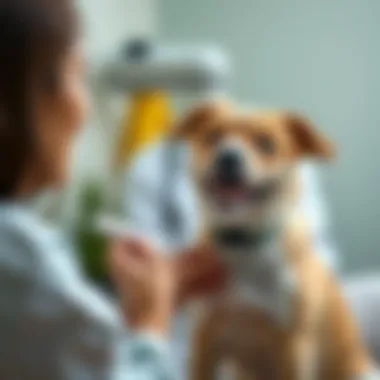Determining the Right Age for Puppy Flea Treatment


Intro
When a new puppy bounds into your life, their wagging tails and innocent eyes can melt even the hardest of hearts. But along with the joy of bringing a puppy home comes the undeniable responsibility of their care. One critical aspect that pet owners need to consider early on is flea medication. Determining the right age to start flea treatment isn’t just a matter of following trends; it’s about ensuring the health and safety of your furry friend.
Pet Care Essentials
Daily Nutrition Requirements
Before we dive into flea medication, it’s essential to grasp the broader picture of pet care. A well-fed puppy lays a solid foundation for a healthy life. Puppies often need specially formulated diets rich in essential vitamins and minerals. For instance, brands like Royal Canin and Hill's Science Diet provide puppy-specific food designed to cater to their growth needs. While individual requirements can vary, a good starting point is by consulting your veterinarian for personalized feeding advice.
Exercise and Playtime
Physical activity is also key. Daily walks and playtime not only keep a puppy engaged but strengthen their physical health too. Activities could range from simple fetch games in your backyard to agility training, depending on the breed and energy level of your pup. Remember, a tired puppy is a happy puppy!
Grooming Tips
Grooming is more than aesthetics; it's a vital part of maintaining skin health and checking for potential flea infestations. Regular brushing can prevent matting and make it easier to spot any unwelcome guests. During grooming sessions, look for any signs of fleas or flea dirt, which can be red flags that a treatment is necessary.
Health and Wellness Check-ins
Veterinary check-ups are crucial. Regular check-ins help catch any health issues early. Many vets recommend a wellness exam around eight weeks of age. This is when they typically receive their first set of vaccines, and it’s an ideal opportunity to discuss flea prevention methods tailored to your puppy’s age, size, and breed.
The Right Time for Flea Medication
Puppies are particularly vulnerable to parasites in their early months. However, premature administration of flea treatments can lead to adverse reactions. Generally, most flea medications are safe for puppies after they reach seven to eight weeks old. But consulting with your veterinarian will provide the best guidance, as they’ll consider your puppy’s unique needs and circumstances.
"Flea prevention is better than treatment. Consulting your veterinarian can save both time and heartache in the long run."
Alternatives to Chemical Treatments
For those wary of chemical treatments, there are alternative flea management strategies. Natural options include essential oils like lavender and peppermint. However, it’s important to note that not all essential oils are safe for puppies, so this approach should be closely monitored. Additionally, things like regular vacuuming and washing bedding can help reduce flea populations significantly without relying solely on medications.
Culmination
Being a responsible pet owner encompasses everything from nutrition to prevention of infestations like fleas. Finding the right age to start flea medication is just a small part of this larger puzzle. As you establish routines and care practices, remember that a close partnership with your vet can guide you in making informed choices for your puppy’s health. Keeping on top of these aspects will ensure a happy, healthy life for your new furry companion.
Understanding Puppy Development
Comprehending puppy development is vital for pet owners as it influences several aspects, including health care, training, and importantly, flea medication. Puppies go through a series of growth phases that significantly affect their immune system and overall vulnerability to parasites like fleas. As a loving owner, recognizing these stages is key to ensuring your pup's wellbeing is prioritized through tailored preventive measures.
In the early weeks, a puppy begins a fascinating journey of growth. Around two to four weeks, a puppy's senses begin to awaken. This stage is when their eyes open and they start to explore the world around them. As their exploration begins, it’s also crucial to protect them from pests that may cause health issues later in life. This time is a critical period for developing a strong immune system, meaning that any external factors, such as flea infestations, can negatively impact their health.
As we move to the four to six weeks mark, socialization is in full swing. Puppies are learning to interact with their littermates and the environment. It’s during this phase that the education begins, setting them up for good behavioral habits. However, exposure to parasites, without proper protection, can lead to issues like skin allergies or infections.
By six to eight weeks, puppies are usually ready for their first vaccination, marking another pivotal point in their development. This is often the stage when discussions around flea prevention become more pronounced. With a stronger immune system from vaccinations, puppy owners may feel more comfortable considering flea treatments.
"ALWAYS consult your vet about the right timing for flea medications based on your puppy's development progress."
Lastly, the period from eight weeks onwards has puppies becoming more resilient, allowing them to transition to new environments, whether that be joining a new family or exploring the outdoors. With this newfound independence comes the heightened risk of encountering fleas. It’s essential to have an effective plan in place before letting your puppy venture too far.
In summary, understanding the intricate details of puppy development helps you tailor flea medication timing effectively. By acknowledging these growth phases, you can better assess when to introduce flea treatments, ensuring that your puppy remains healthy and happy.
The Necessity of Flea Treatment
Fleas are not just tiny nuisances; they can pose significant health risks to your puppy. Early flea treatment is crucial for several reasons. First off, these little critters can cause incessant itching, leading to skin infections and other complications. A young puppy's immune system is still developing, making it even more vital to protect them from flea infestations that can compromise their health. Furthermore, fleas are carriers of various diseases, some of which can be transmitted to both pets and humans.
Why treat for fleas?
- Prevent Discomfort: Puppies suffer from itching and irritation, which affects their quality of life.
- Health Risks: Fleas lead to more than just scratching. They can cause anemia in severe cases, especially in young or small puppies whose blood volume is lower.
- Infestation Control: Flea problems can escalate quickly—flea eggs can hatch and multiply at an alarming rate. Starting treatment promptly can prevent a minor annoyance from becoming a full-blown infestation.
It's clear that flea treatment is more than just a preventive measure; it's essential for the overall health and well-being of your puppy.
Recognizing Flea Infestation Signs


You might wonder how you can tell if your puppy has fleas. The signs can sometimes be subtle, and in a world where we have countless distractions, it’s easy to overlook them. Look for these indicators:
- Excessive Scratching: If your puppy is scratching more than usual, it’s time to take notice.
- Red or Irritated Skin: Pay attention to any areas of redness or inflammation on their skin, which can be a telltale sign of flea bites.
- Flea Dirt: Flea feces often appear as tiny black specks that may be visible on your puppy's fur or bedding. If you see them, it's a sure sign that fleas are present.
- Restlessness: A puppy that can't settle down might be feeling uncomfortable due to itching or irritation.
Being vigilant about these signs helps you act promptly, considering early intervention is key. Dogs communicate their discomfort in ways we have to learn to see—don't let these signs slip past you.
Consequences of Untreated Fleas
Ignoring the signs of a flea infestation can lead to serious consequences for your puppy. Apart from the immediate discomfort they experience, the long-term effects can escalate into significant health issues. Some of the most prominent consequences include:
- Anemia: Particularly in young puppies, a heavy flea infestation can drain their blood, leading to anemia. This is a severe condition that requires immediate veterinary care.
- Skin Infections: Continuous scratching can break the skin barrier, inviting bacteria and other pathogens that can cause serious infections. Bacterial skin infections can be challenging to treat and may require prolonged veterinary interventions.
- Allergic Reactions: Some dogs develop allergies to flea saliva, leading to severe itching, rashes, and even secondary skin infections.
- Transmission of Diseases: Fleas can transmit several diseases, including Bartonella—which has implications for both dogs and humans—and tapeworms, further complicating the puppy’s health status.
It’s always easier to prevent fleas than to treat the fallout from an infestation.
Thus, actively engaging in flea treatment is not just about comfort; it’s about safeguarding your puppy’s health and setting them up for a long, happy life.
When to Start Flea Prevention
Starting flea prevention at the right time is pivotal for ensuring the health and comfort of your puppy. Fleas can be a significant nuisance, causing irritation and even fostering serious health complications if not addressed promptly. By understanding when to commence treatment, you not only safeguard your pet but also create a healthier living environment.
Choosing the appropriate time frame for flea prevention can depend on various factors including your puppy's age, weight, and specific living conditions. Addressing these aspects thoughtfully will help increase the likelihood of successful flea management while minimizing risks associated with premature medication use.
Recommended Age for Treatment
Generally, most veterinarians agree that flea prevention should start when puppies are around six to eight weeks old. This timeframe coincides nicely with their initial vaccinations, offering a dual benefit of health protection against fleas and other potential parasites. It's crucial to consult a veterinarian before beginning any treatment designed for flea prevention, as they can recommend the safest and most effective options for puppies within this age range.
Dogs of that young age can react differently to medications, and not all flea treatments are suitable for them. This care ensures that your puppy receives an age-appropriate treatment, allowing for effective flea management without adverse side effects.
Factors Influencing the Timing
Weight of the Puppy
The weight of your puppy plays a significant role in determining the right moment to start flea prevention. Heavier puppies may tolerate certain flea treatments earlier, while lighter breeds might be more sensitive to medications. Often, flea medications are prescribed based on weight rather than age, creating a specific dosing protocol that is crucial for safety and efficacy.
One should also consider that some treatments may be formulated for larger dogs and could create risk for smaller breeds if dosed incorrectly. Therefore, weighing your puppy accurately is essential before initiating any treatment. Ensuring that any flea medication aligns with your puppy's current weight helps avoid dangerous overdosage.
Health Status
The overall health of your puppy should be another cornerstone in deciding when to start flea medication. Puppies suffering from illnesses or other medical conditions may need to postpone flea treatment.
Discussing your puppy’s health with a vet is critical. A puppy with a weak immune system could have complications when receiving flea treatments too early. A veterinary professional will help assess your pet's condition, guiding you on the safest timeframe for starting flea prevention while factoring in any existing health concerns, thus optimizing safety.
Environmental Exposure
Finally, environmental factors cannot be ignored when considering flea prevention. If you live in an area with high flea populations, delaying treatment might invite a more severe infestation. Conversely, in a flea-free environment, the urgency might lessen, allowing for a more gradual approach to treatment.
Puppies exposed to other pets, particularly those already infested with fleas, will require prompt attention. Observing your puppy's surroundings and taking preventive measures based on environmental factors demonstrates responsible pet ownership. Regularly grooming your puppy in a flea-prone area and keeping the home clean goes a long way in managing potential flea threats before they become a bigger problem.
"An ounce of prevention is worth a pound of cure." It’s better to act with foresight than to deal with the aftermath of an infestation.
In summary, taking into account your puppy’s weight, health status, and environmental exposure can help to decide the best timing for flea medication. Consulting your veterinarian will ensure you make informed choices that benefit your puppy’s health in the long run.
Types of Flea Medications
Flea medications are essential for maintaining a healthy environment for puppies. The right type of medication can protect your puppy from the discomfort and potential health risks associated with flea infestations. There are several options available, each tailored to different needs and lifestyles. Understanding these choices helps pet owners make informed decisions that best suit their furry friends. Whether you lean towards topical solutions, oral medications, or collars, knowing the specifics of each type is vital. The effectiveness, ease of application, and safety considerations all play significant roles in the selection process.
Topical Solutions
Topical solutions are a popular option among pet owners. These treatments are typically applied directly to the skin and often come in the form of pipettes or sprays. Here's why they stand out:
- Ease of Application: Topical medications are quite straightforward to apply. Simply part the fur and squeeze the solution onto the skin, usually between the shoulder blades. This method ensures that the puppy cannot lick it off right away.
- Rapid Action: Many topical treatments start working within hours, quickly killing fleas on contact. This is particularly beneficial for puppies who may already be experiencing discomfort from bites.
- Variety of Formulations: There are many brands available, providing options tailored to specific needs, such as flea, tick, or mosquito control.
Keep in mind that it’s important to choose products formulated specifically for puppies, as adult formulations may contain higher concentrations that could be harmful.


Oral Medications
Oral medications offer a different approach to flea control. These treatments are ingested and work from the inside out. They may include pills or flavored chews that are palatable for most puppies. Consider the following benefits:
- Comprehensive Action: Oral flea medications often provide broader coverage, targeting various life stages of fleas and preventing infestations before they start.
- Convenience: Once administered, there’s no need for reapplication for several weeks to months, depending on the product’s longevity.
- Low Risk of Resistance: The effectiveness of some oral medications can remain stable over time, unlike certain topical solutions that may see decreasing effectiveness as fleas adapt.
However, puppy owners must ensure that the medication is appropriate for the puppy’s weight and age to avoid side effects.
Collars and Other Alternatives
Flea collars and alternative measures offer additional layers of protection and can complement topical and oral treatments. Here’s what you should know:
- Long-Lasting Protection: Flea collars can provide protection for months. They release active ingredients that create a barrier around the puppy’s neck, killing fleas and ticks on contact.
- Less Frequent Replacement: This option can be excellent for busy pet owners, as it doesn’t require daily or even weekly application like some other forms need.
- Use of Natural Ingredients: Some collars utilize essential oils and other natural components, appealing to those who prefer a more holistic approach to pest management.
However, collars should be fitted properly and checked regularly to prevent any irritation to the puppy’s skin. It’s crucial to monitor these treatments closely to ensure they remain effective and comfortable for your pup.
In all cases, it’s best to consult a veterinarian to decide which flea medication is most suitable for your puppy based on factors such as age, health, and living environment. Choosing the right product can not only help your puppy feel more comfortable but also protect them from diseases that fleas may transmit.
Consulting Veterinary Professionals
Consulting a veterinary professional is a crucial step in ensuring the health and well-being of your puppy when it comes to flea medication. Pet owners often face an overwhelming amount of information, from various products to home remedies, but nothing replaces the expertise of a qualified veterinarian. This professional guidance not only addresses timing and appropriateness of treatment but also considers the unique characteristics of your puppy.
A veterinarian can evaluate your puppy’s specific needs based on age, breed, and health status, ensuring that you make informed decisions about flea prevention. Moreover, they can illuminate potential health risks associated with early flea treatment that novice owners might overlook. This way, you don't fall into traps created by misconceptions or anecdotal advice found on the internet.
“The health of your puppy is of utmost importance, and a good vet will tailor treatments based on individual circumstances.”
Importance of Professional Guidance
Having a professional give you guidance can be a game-changer. Not only do they provide tailored advice, but their knowledge enables them to identify flea infestations before they become a serious problem. Earliest signs are often subtle and might miss the untrained eye.
Additionally, veterinarians stay current with the latest research on flea treatments and side effects. This knowledge helps them recommend safe products that will effectively keep your puppy protected without jeopardizing their health. It’s also essential for dog owners to recognize that each flea treatment varies in terms of dosage and intended age of use, and these factors can significantly influence the overall well-being of your puppy.
Working with a veterinarian ensures you’re not just winging it in the dark; rather, you’re making confident, informed choices.
Scheduling the First Veterinary Visit
Timing is everything when it comes to your puppy's first veterinary visit. Ideally, this should occur within the first few weeks of adopting your new furry friend. Early visits allow the vet to assess not just for fleas but for an array of potential health issues. This is stratified, especially since young puppies have delicate immune systems.
When scheduling, be upfront about your concerns regarding flea prevention and other health issues. Discuss any previous experience you've had with pets, if applicable. The first visit gives the vet the chance to perform a general examination, check for fleas, and discuss a flea prevention plan tailored for your puppy. Keep in mind that some treatments may be initiated at different ages, so the first visit can set the benchmark.
Ultimately, understanding the ebb and flow of your puppy's health starts at that initial contact with a veterinary professional. Getting the right advice early ensures your puppy grows up to be a healthy, happy companion.
Risks Associated with Early Treatment
When it comes to administering flea medication, the timing matters immensely. Puppies, in their formative stages, have delicate systems that may not react well to premature treatments. Understanding the risks associated with early administration is crucial for responsible pet ownership. Medications that target fleas can often cause more harm than good if given too soon.
Potential Side Effects
Flea medications come in various forms, each designed to disrupt the life cycle of fleas. However, these substances can also introduce unwanted side effects, particularly in puppies still developing. Common side effects can range from mild to severe and may include:
- Vomiting: This is a frequent reaction seen in puppies. It may simply be their body rejecting the medication.
- Diarrhea: An upset stomach can lead to gastrointestinal disturbances, which are never enjoyable for young puppies.
- Lethargy: If your playful pup suddenly turns into a couch potato, this could indicate they’re not tolerating the medication well.
Many times, these side effects resolve on their own, but some cases could escalate into more serious health concerns. Therefore, keeping a close eye on your pup after administering any flea treatment is critical. If any severe symptoms arise, it's wise to consult a veterinarian.
Overdosage Concerns
Another significant risk is the danger of overdosage. Flea medications often have dosage recommendations based on weight and age, but puppies may vary quite a bit in both respects. Puppy owners must be vigilant because:
- Small Differences Matter: A slight miscalculation in weight can lead to administering a dose that’s too strong for your furry friend. For instance, a 10-pound puppy may face different risks than another puppy weighing just 8 pounds but receiving the same treatment.
- Developmental Variations: Since puppies are still growing, their ability to metabolize medications can be unpredictable. An overdose can potentially lead to severe reactions, including neurological issues or even life-threatening conditions.
In summary, the risks associated with early flea treatment in puppies underscore the importance of cautious decision-making. A misstep could lead to more problems than it solves. Thus, consulting a veterinarian before initiating any flea medication is highly recommended.
"Making informed choices when caring for your puppy fosters a safe and healthy environment for their growth."


By being aware of the potential side effects and understanding the serious implications of overdosage, you take a significant step toward ensuring your puppy’s health and happiness.
Alternative Flea Management Strategies
When it comes to keeping your puppy safe from fleas, conventional medication is just one piece of the puzzle. Considering alternative flea management strategies can be a game-changer, especially for those furry companions still in their formative years. While it's crucial to consult with your veterinarian about the right age for using chemical treatments, exploring these alternatives provides an additional layer of protection, without rushing into potentially harmful medications too early.
Natural Remedies
Many pet owners are turning to natural remedies as a more gentle approach to flea management. Some common options include:
- Diatomaceous Earth: This powdery substance is derived from fossilized algae. When applied to your dog's coat or around the home, it can desiccate fleas, leading to their demise. Just ensure that it is food grade to avoid any health complications.
- Herbal Flea Collars: You can make your own flea collar at home using herbs that repel fleas. Bundling some rosemary or basil in a bandana worn around your puppy's neck not only has a pleasant smell, but it can also help keep those pesky fleas at bay.
While natural remedies can be effective, their efficacy may vary from one dog to another. It’s wise to keep an eye on any changes in your puppy's behavior or coat. If you see something amiss, adjusting your approach may be necessary.
Environmental Control Measures
Tidying up your home is another strategy that goes hand-in-hand with flea management. Fleas don't just target your puppy; they establish nests in your living space. Applying a multi-faceted approach ensures a flea-free zone is maintained. Consider the following measures:
- Regular Sweeping and Vacuuming: This removes eggs, larvae, and adults hiding in your carpets and upholstery. Use a vacuum with a strong suction, and don’t forget to dispose of the bag or empty the canister outside to prevent reinfestation.
- Wash Bedding Frequently: Keeping your puppy's bedding clean is essential in controlling flea populations. Hot water washing weekly or bi-weekly helps eliminate any pests that might be lurking.
- Utilizing Flea Traps: Simple and effective, flea traps use light and warmth to attract fleas, capturing them before they can jump onto your puppy. Place these traps in areas where your pup spends the most time.
- Outdoor Management: For those with yards, maintaining the terrain is crucial. Keeping the grass trimmed and using gravel rather than soil can deter fleas, as they thrive in moist, shady environments.
By combining both natural remedies and environmental control measures, you create a robust defense against fleas. This approach is especially essential for puppies, who might be more sensitive to harsh chemicals.
"Veterinarians recommend adopting a holistic view towards flea prevention: it’s about treating the pet and the environment simultaneously."
Incorporating these strategies can make a significant difference in your puppy’s well-being, giving you peace of mind as you navigate the path of pet ownership.
Monitoring Your Puppy’s Health
Keeping an eye on your puppy's health is crucial, especially when it comes to flea medication. A puppy's body is still growing, making them particularly sensitive to treatments that an adult dog might handle well. By closely monitoring your puppy, you will better understand their unique needs and appropriate response to any treatments.
Regular Check-Ups
Regular veterinary visits are an important facet of monitoring your puppy's overall well-being. It is recommended to take your puppy for check-ups at least once a month during their first few months of life. These visits allow for vaccines to be administered and provide opportunities for veterinary professionals to spot potential health issues early.
During these check-ups, your vet will assess your puppy's weight, growth, and general health. Discussions about flea treatment options and recommendations can be made here as well. Ensuring your puppy is on a proper feeding and care schedule can also dramatically influence their health long-term.
- Growth Tracking: Vets will measure weight gain to ensure that your puppy grows at a healthy pace.
- Vaccinations: Regular vaccinations help prevent disease, which ultimately boosts their immune system, making them better suited to fight off infestations.
- Flea Management Insights: You can discuss any flea-related concerns and your veterinarian will help tailor an appropriate flea treatment plan based on your puppy's age and weight.
Observing Behavioral Changes
Puppies, just like humans, communicate through their behavior. An unexpected change in their mood or activity could hint at a health problem. Flea treatment may cause varying reactions in puppies, so being vigilant can make all the difference.
Pay attention to notable shifts in your puppy's demeanor. If your usually playful pup suddenly becomes lethargic, this could be a signal that something isn't right. Also, behavioral signs like excessive scratching, biting, or changes in eating habits may indicate flea discomfort or adverse reactions to medication.
- No Scratching: If they scratch or bite at their skin often, it may suggest fleas are present despite treatment.
- Less Interaction: Puppies love to play, and a sudden withdrawal from activities might suggest they aren't feeling their best.
- Changes in Appetite: Eating less or not at all can denote stress or illness, which warrants a closer examination.
"Keeping track of your puppy's behavior is just as important as regular check-ups; both work together to keep your furry friend healthy and happy."
Being proactive about monitoring your puppy’s health not only enhances their quality of life but also ensures that treatments, such as flea medication, can be adjusted quickly if necessary. Making these observations and acting upon them properly can save your puppy from unnecessary distress.
Summary of Key Points
Understanding the safe and appropriate age for flea medication in puppies is paramount for all pet owners. Fleas not only cause discomfort but can also lead to more serious health issues if left untreated. In this article, we have dissected the various aspects of flea treatment, emphasizing several core concepts that veterinarians advocate.
Safety and Efficacy
Administering flea medication at the correct age is crucial to ensure both safety and efficacy. While some treatments may promise rapid results, they can pose risks if given too early. Puppies, particularly those that are very young, have delicate systems. Their immune systems are still developing, making them vulnerable to adverse reactions. For example, the weight and age of a puppy can significantly influence which medication is suitable.
Veterinary guidance is essential here; not all treatments are designed for very young dogs. Some medications might contain chemicals that could potentially harm a puppy, resulting in side effects such as vomiting or lethargy. Monitoring the puppy closely when starting a new treatment is wise, as any signs of distress should be addressed promptly with a professional.
Below are key points to consider regarding safety and efficacy:
- Consultation: Always consult your veterinarian before starting any flea treatment.
- Timing: Follow recommended age guidelines strictly to ensure the product’s safety.
- Product Choice: Not all flea medications are created equal; choose one that is suitable for your puppy's specific life stage.
"The health of your puppy depends not just on what you choose, but when you choose it."
Long-Term Care Considerations
Flea control goes beyond just the immediate application of medication; it’s about establishing a holistic approach to your puppy’s health. Here are some factors to keep in mind:
- Regular Check-Ups: Schedule vet visits regularly to assess your puppy’s overall health. They can guide you on when to switch medication or make adjustments based on your puppy’s growth.
- Monitoring Health: As puppies grow, their health needs will change, and so may their susceptibility to flea infestations. Regularly check for any signs of fleas or related issues, such as skin irritations.
- Environmental Cleaning: Keeping your home and yard flea-free is just as important as medicating your puppy. Regularly wash their bedding and vacuum your living space to eliminate any potential infestation.







